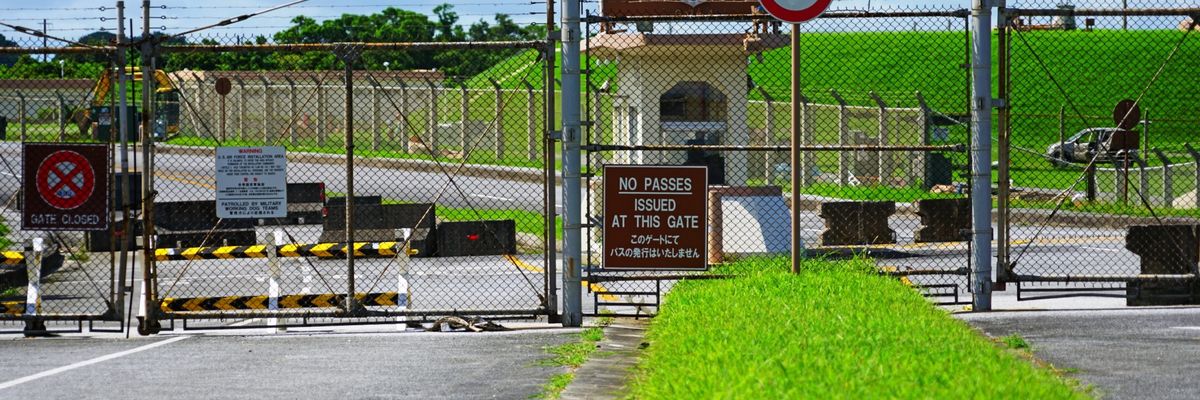Okinawans opposed to the expansion of U.S. military bases on their island have been upset by the environmental damage, the accidents, and the crimes associated with the presence of 25,000 American troops. Now the anti-base movement has one more powerful argument to use in its case to shrink the U.S. footprint in this southernmost Japanese prefecture: the coronavirus.
Until recently, the novel coronavirus pandemic had largely spared Okinawa. There had been fewer than 150 infections and only seven deaths among a population of nearly 1.5 million.
This week, however, Japanese media reported 100 cases of COVID-19 among U.S. military personnel following “reports of troops taking part in parties in downtown areas and beaches around July 4 to celebrate Independence Day.” Those infections were likely introduced by new arrivals coming from the United States. Japan has a travel ban in place that prohibits Americans from coming to the country. The ban, however, includes an exemption for U.S. military personnel.
Japan is understandably concerned about this outbreak. The country has been largely successful in containing the coronavirus, with around 22,000 cases overall and fewer than 1,000 deaths. However, the number of new infections has steadily risen from double digits in June to as many as 427 on July 10. The United States, meanwhile, is experiencing a significant surge in new infections — because of the same lapses in social distancing committed by the American soldiers on Okinawa — and the military has been a locus of infection. In March, the aircraft carrier Theodore Roosevelt suffered a major outbreak, U.S. military personnel saw a 60 percent jump in cases in the first two weeks of July, and there have been more than 50 cases among U.S. soldiers in South Korea. Japan doesn’t want to suffer because of the comparatively lax approach that Americans, and the U.S. military, have taken toward the pandemic.
This fresh outbreak of cases adds to the already decades-long dispute among Washington, Tokyo, and Okinawa over U.S. military bases on the island. The conflict has been most acute around the closure and relocation of the Futenma Marine Corps Air Station in Ginowan. Over the objections of Okinawans, the U.S. and Japanese governments have agreed to build a replacement facility at Henoko, on the coast near the city of Nago. Construction has already begun to reclaim land in order to build helipads, despite the environmental damage to the area and a geological survey that revealed that the seabed was too soft to bear the weight of such construction. Although the reclamation paused in April when a worker came down with COVID-19, the work started up again last month.
Through it all, a majority of Okinawans have opposed this new base construction. In a referendum last year, more than 70 percent of the island’s voters said no to the base at Henoko. In 2018, they elected Denny Tamaki, the son of a Japanese mother and a U.S. Marine, to become governor of the prefecture on the strength of his anti-base stance. And in last month’s elections, they gave Tamaki a majority in the prefectural assembly.
Okinawans have used various methods to oppose the new base construction. At the policy level, Okinawan leaders have tried to stop the project by revoking permits for land reclamation and filing legal injunctions based on environmental considerations, only to be over-ruled by Japanese courts. Meanwhile, a dedicated group of anti-base activists has conducted a seven-year sit-in at the gates of Camp Schwab, which is close to the new construction.
Even before the most recent coronavirus outbreak on Okinawa, anti-base activists were hoping that the Trump administration would alter U.S. policy. Last month, Trump announced a withdrawal of nearly 10,000 U.S. soldiers from Germany. Meanwhile, the U.S. president was demanding that Tokyo quadruple the amount of money it was paying for host-nation support, which could drive a wedge between the two military allies. In the COVID-19 era, greater Pentagon focus on protecting the U.S. homeland and less emphasis on forward defense might also take the pressure off countries on the front line like Japan to host large, costly bases.
However, the growing focus in U.S. military circles on countering China trumps those considerations. Some of those U.S. troops withdrawn from Germany are already on their way to Asia. A burden-sharing compromise is likely between now and when the next host-nation support agreement is due in March next year. And with the currently high levels of U.S. military spending, the Pentagon wants to maintain both homeland protection and forward defense.
So, the latest outbreak of coronavirus among U.S. personnel on Okinawa represents a possible gamechanger where legal suits, protests, and potential shifts in U.S. military strategy have so far failed to derail the Futenma base replacement. With no sign of a vaccine in sight, the trans-Pacific movement of American soldiers who could serve as a significant vector for disease represents a clear and present danger for Japan. The eagerness of the Trump administration and its allied governors to press ahead with a reopening of the U.S. economy in the face of mounting coronavirus cases — and absent a robust testing and tracing system — will further strain relations with allies, even perhaps to the point of precipitating a transformation of U.S. overseas basing.
The Pentagon has long argued that the United States needs military bases on Okinawa because of the “tyranny of distance.” Pentagon planners want U.S. forces close to potential hotspots like the South China Sea. The coronavirus, however, has put a whole new spin on this concept. U.S. allies are now concerned about their proximity to a different hotspot altogether: the military representatives of an infectious superpower.
















